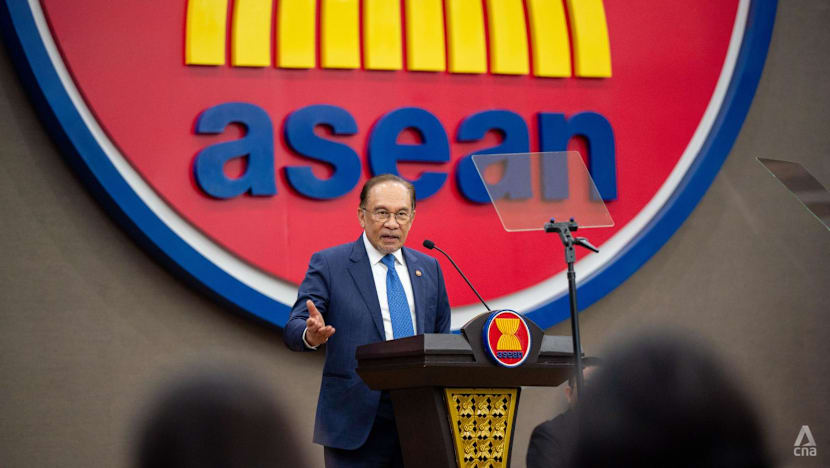Commentary: Trump is dominating the ASEAN Summit before he even lands in Malaysia
Malaysia, as this year’s ASEAN chair, has gone to great lengths to secure high-level participation, says political analyst James Chai.


This audio is generated by an AI tool.
KUALA LUMPUR: Donald Trump’s expected visit to Kuala Lumpur for the ASEAN Summit this month will be the first time a US president has visited Malaysia in nearly a decade, the last being Barack Obama in 2015.
It will also be the first time Mr Trump has agreed to attend the ASEAN leaders’ meeting since returning to office. During his first term, he went to the 2017 summit in the Philippines but skipped subsequent gatherings, raising questions about his administration’s commitment to the region.
Why is he coming now? By most measures, Southeast Asia has never been a high priority on Mr Trump’s foreign policy agenda. The term “Southeast Asia” has not featured much in the first 10 months of his second term, except in rather punitive terms, of negotiating trade for tariff reduction and warnings of avoiding enmeshing too closely with the US’s primary adversary, China.
That makes his expected attendance in Kuala Lumpur all the more significant.
Malaysia, as this year’s ASEAN chair, has gone to great lengths to secure high-level participation, with an aim to organise the “largest and most high-profile gathering of world leaders to date”.
Despite pushback from political rivals and calls for a protest against Mr Trump’s attendance, Prime Minister Anwar Ibrahim views the summit as a major diplomatic platform. He has been making a calculated effort to elevate Malaysia’s international profile, showing off his adept use of host diplomacy.
In just the past few months, Malaysia has hosted the inaugural ASEAN-Gulf Cooperation Council-China summit, helped broker a ceasefire between Thailand and Cambodia, and came close to securing a rare attendance by both Mr Trump and Chinese President Xi Jinping at the ASEAN Summit.
While Mr Xi is now expected to skip the summit, key leaders from large Global South blocs, including Brazil President Luiz Inacio Lula da Silva, South African President Cyril Ramaphosa and India Prime Minister Narendra Modi have confirmed their attendance.
HOST DIPLOMACY
When used well, the power of “host diplomacy” can be an effective way to showcase Malaysia’s strengths and offerings to the world. The ASEAN Summit guest list symbolises its stature; an inclusive one shows its values.
First, if Malaysia could act as a negotiating ground for better trade ties between US and China and the rest of the world, it would finish its chairmanship with high credibility. Mr Trump has spoken confidently of an in-person meeting with Mr Xi, but that has not happened yet, pointing towards continued tensions.
If Mr Trump meets with Chinese Premier Li Qiang in Kuala Lumpur on trade and the economy and show some signs of thawing of bilateral relations, it would be a major optics success.
Second, bilateral meetings between key leaders could further ease tensions, especially if they are with the US.
Third, if ASEAN could walk away collectively knowing that they are on Mr Trump’s good books, member states could feel more assured by Malaysia’s regional leadership.
All of this would undoubtedly build on Mr Anwar’s most significant regional victory of his ASEAN chair term – brokering a truce in the deadly Thailand-Cambodia border conflict. The picture of Mr Anwar clasping the hands of Thailand and Cambodia’s leaders in unity at the end of the press conference was a strong one.
Mr Anwar’s efforts in facilitating the deal could arguably be the reason why Mr Trump agreed to visit Malaysia. According to Malaysian media, Mr Trump called Mr Anwar’s efforts a "fantastic job". Shortly after the phone call between the two leaders, Mr Anwar told Parliament that the US president had agreed to attend the ASEAN Summit. In late September, Mr Trump once again praised Mr Anwar’s efforts, during US Trade Representative Jamieson Greer’s visit to Malaysia.
PERSONALITY-DRIVEN FOREIGN POLICY
Foreign policy occasionally comes down to personalities. This is especially true for Mr Trump.
At the ASEAN Summit in Manila in 2017, Mr Trump pointed to his “great relationship” with then Philippine president Rodrigo Duterte. It could be that he sees Mr Anwar as tough enough to quell a brewing conflict that may harm trade and stability of the region. It fits his priorities of being the “president of peace”, however mixed the results or tenuous the link to his actions.
The intangible factors of diplomacy, for example personal chemistry, often matter more than they are given credit for. This is especially important for middle states like Malaysia that are stuck between great power conflicts. It must deploy both hard and soft methods, mixing formal diplomacy with backchannel engagement, knowing how to show defiance without provocation.
Academics call this “hedging”. While there is growing opposition to disinvite Mr Trump, Malaysia does not have a real choice but to continue to engage both US and China deeply, but also, contradictorily.
That means Malaysia, and to a varying extent, ASEAN, must engage with the US on trade and investments, but condemn its support for Israel in Gaza, and continue deepening relations with its adversary, China.
At the same time, it must enhance bilateral ties with China through expanded forums, welcome foreign direct investments and partnerships, while working with the US on joint military exercises and assert its maritime rights on South China Sea.
While Malaysia could take strong moral stances relating to issues like Gaza- and it has on multiple occasions - it cannot take an absolutist position against any one great power. In other words, it can take stances, but it cannot take sides. Doing so would threaten its survival on the global stage.
The real risk, however, that the Trump invitation carries is the potential of the US leader seeking the spotlight for himself. According to reports this week, Mr Trump is demanding a special ceremony on the sidelines for the ASEAN Summit to spotlight his role in the Thailand-Cambodia peace talks. Sources also said the White House requested that Chinese officials be left out of that event.
Malaysia will need to make Mr Trump feel welcome without appearing to concede ground. It will need to take a strong stance on free trade, multilateralism and world peace without embarrassing the president. All of this must be done with classic Southeast Asian politeness and courtesy.
Pulling it off will require skill.
James Chai is a political analyst, columnist and the author of Sang Kancil (Penguin Random House). He writes a monthly column for CNA, published every second Friday.


















